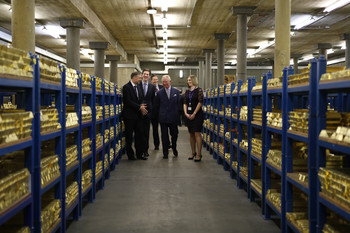|
| |
Diseconomies of scale are disadvantages faced by large organizations such as bureaucracy, heavy weight processes, inability to change and failure to innovate. It could be argued that companies tend to be less efficient, creative and responsive as they grow. This opens opportunities for smaller competitors who may eventually topple the larger firm's dominant position in a market. The term diseconomies of scale is also used to describe government departments that appear to have become dysfunctional due to their size. ExamplesExcessive confidence and hubris.Failed initiatives of change.Bureaucracy and heavy weight processes.Failure to listen to critics, dissatisfied customers or warnings from regulators.Duplication of effort.Excessive office politics.Top heavy organizations with many middle managers who deliver questionable value.Lack of accountability for decisions.Big thinking resulting in needless complexity, overspending and overcapacity.
Corporate NarcissismCorporate narcissism is an brash sense of overconfidence that can occur within large firms or firms with a prestigious brand. Such firms tend to have an antagonistic relationship with customers, regulators and partners. Law of Expanding BureaucracyThe Law of Expanding Bureaucracy, also known as Parkinson's Law is the idea that bureaucracies tend to grow irrespective of the amount of work that needs to be done. Large firms with high revenue may expand their organization simply because they can afford it. Such expansions may add dubious value. |
Function | | Definition | Inefficiencies faced by large firms or government departments. | Related Techniques | |
Next: Economies Of Scale
Economics
This is the complete list of articles we have written about economics.
If you enjoyed this page, please consider bookmarking Simplicable.
A list of economic theories that are particularly useful for business.
The tendency for people at high risk to buy insurance.
A list of economic positions or capabilities that allow you to outperform in a particular industry.
A definition of knowledge work with examples.
A definition of production with examples.
An overview of post-scarcity.
The common types of economic infrastructure.
The common types of business competition.
The common types of inefficiency.
An overview of supply with common examples.
An overview of the topics covered by international economics.
An overview of global business with examples.
The definition of economic relations with examples.
The definition of pull factor with examples.
A list of common push factors for human migration.
An overview of potential pros and cons of globalization.
An overview of international trade with examples.
A list of goods by type.
A list of common economic outcomes.
An overview of economic institutions with examples.
TrendingThe most popular articles on Simplicable in the past day.
Recent posts or updates on Simplicable.
Site Map
© 2010-2023 Simplicable. All Rights Reserved. Reproduction of materials found on this site, in any form, without explicit permission is prohibited.
View credits & copyrights or citation information for this page.
|






























